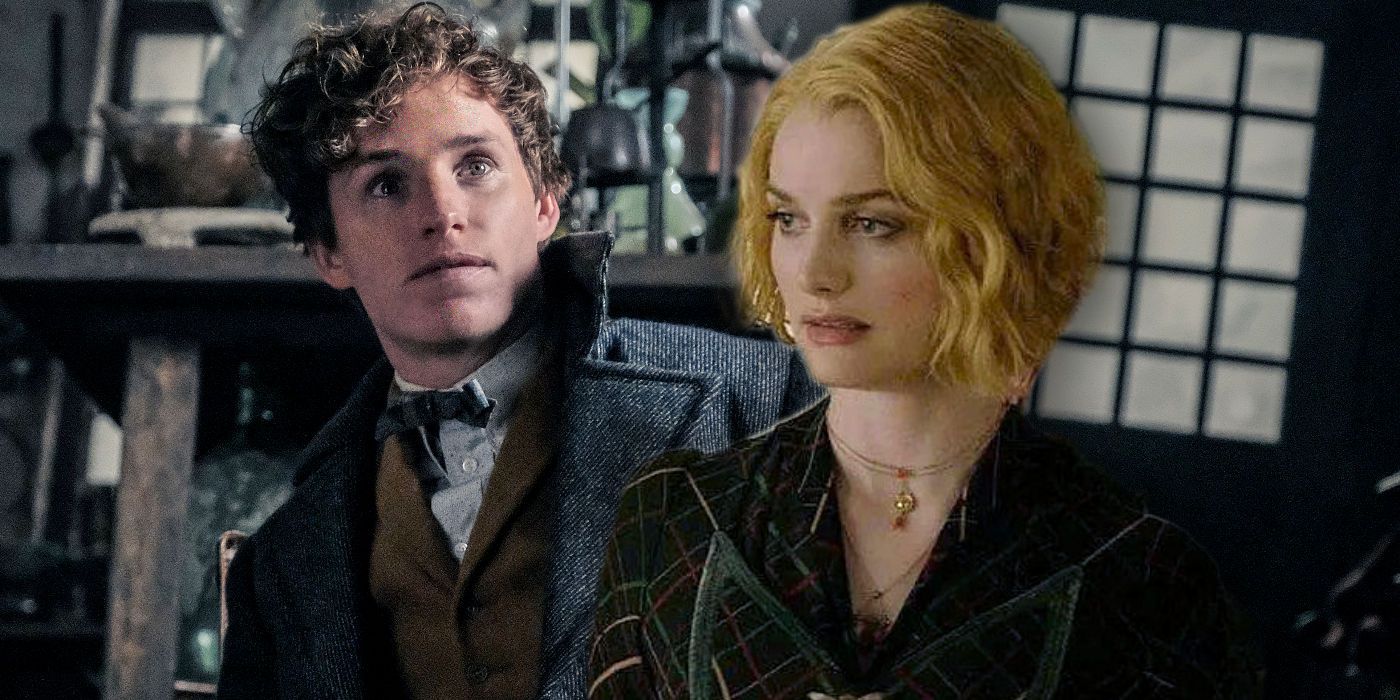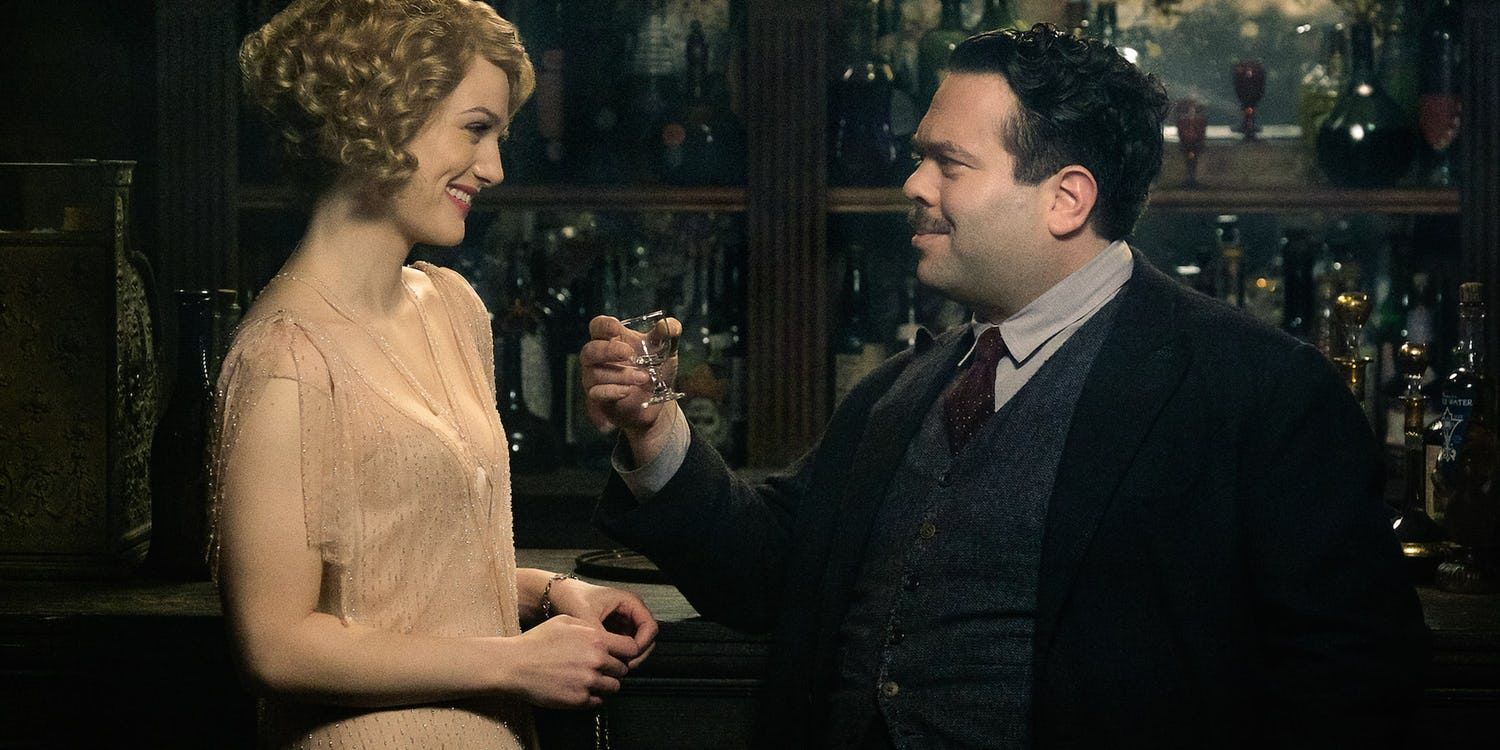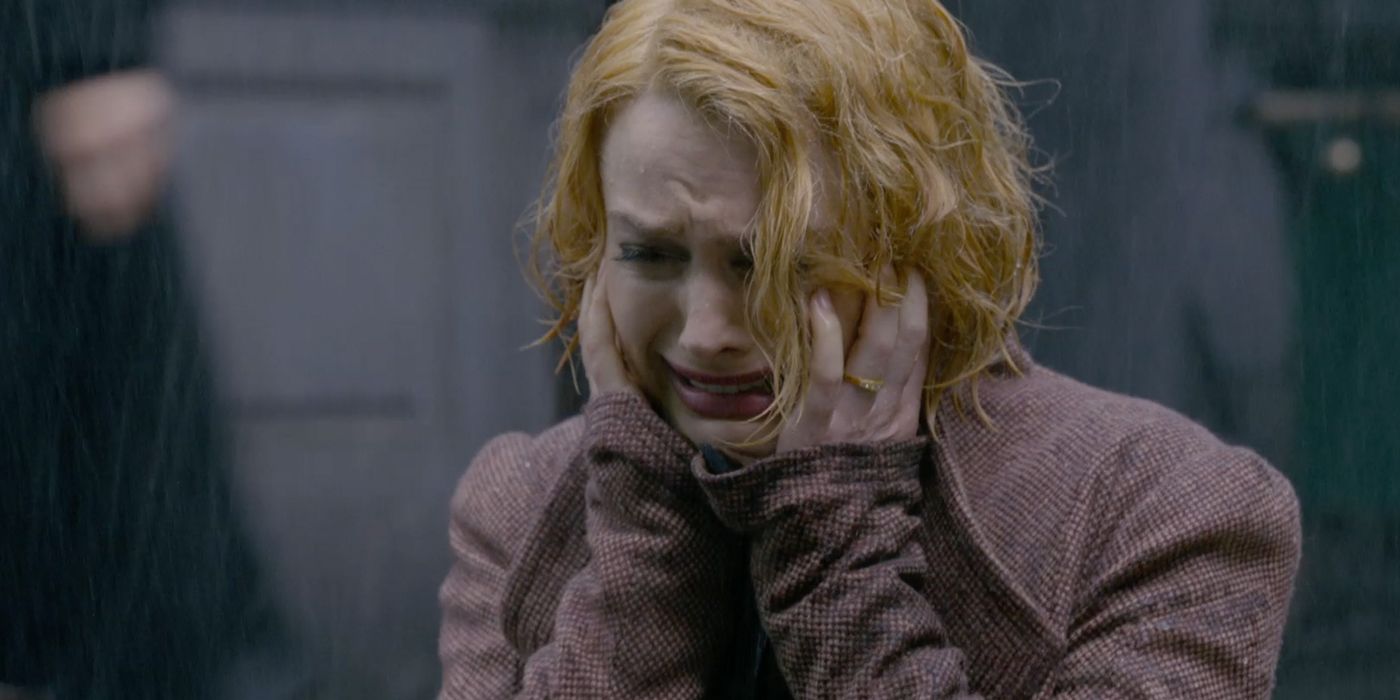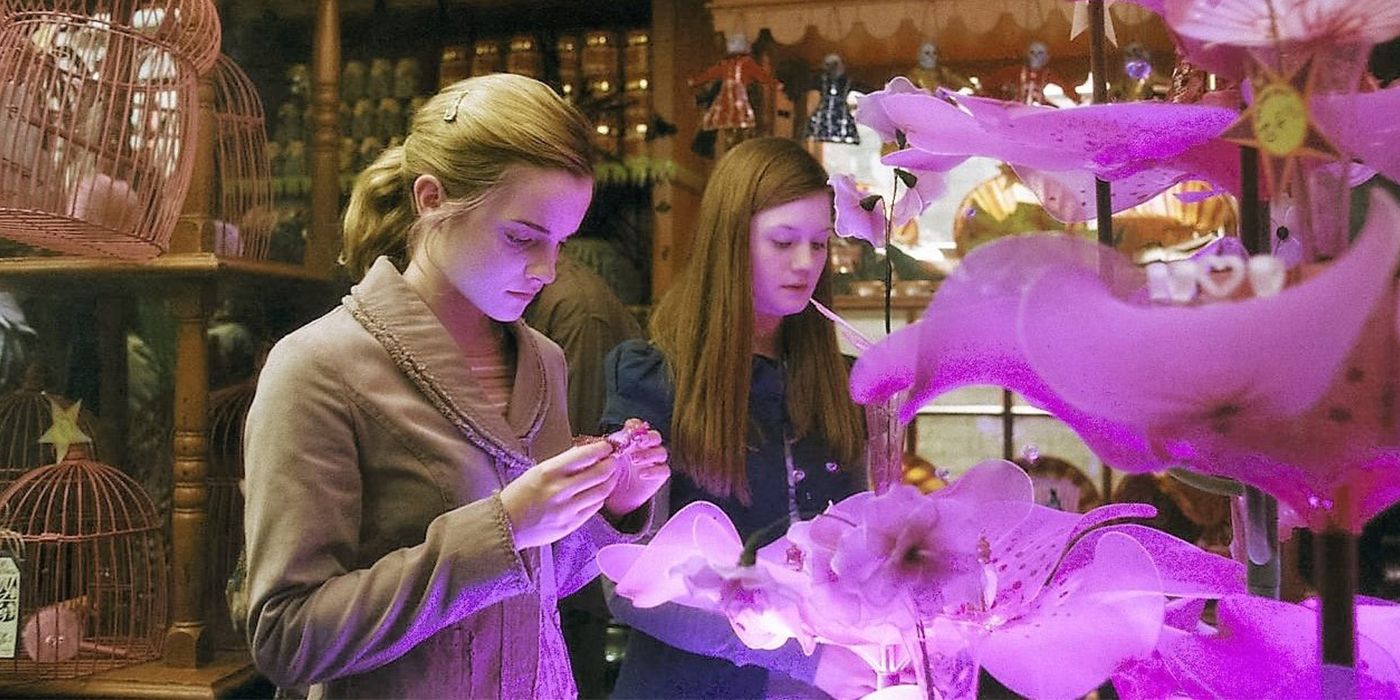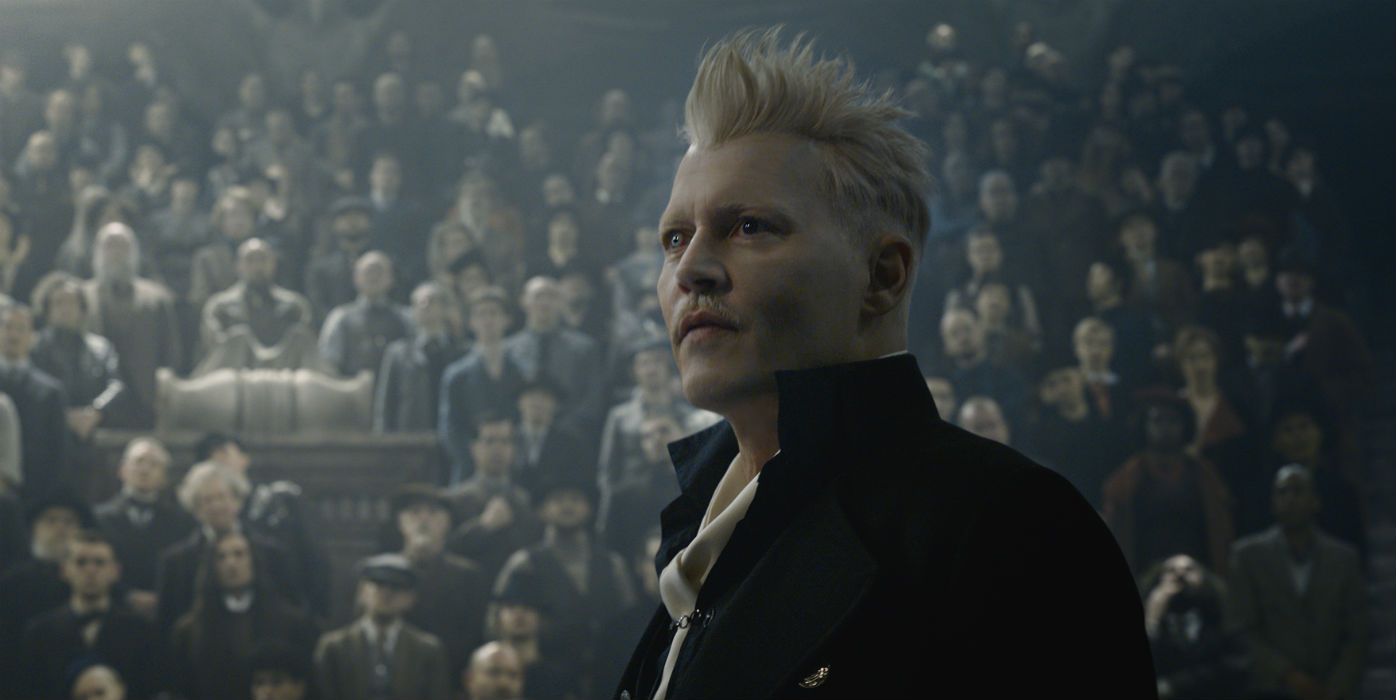Warning: This article contains SPOILERS for Fantastic Beasts: The Crimes of Grindelwald.
The character of Queenie Goldstein was forever ruined by Fantastic Beasts: The Crimes of Grindelwald. While the Fantastic Beasts sequel has drawn a good deal of criticism from fans of the J.K. Rowling's Wizarding World, the film's treatment of Queenie has been almost universally derided. This is largely due to the feeling that Fantastic Beasts 2 took a competent, clever, and beloved heroine and changed her into a crazed and confused puppet with no scruples at all.
Ignoring the changes to Queenie as a character, her story arc in The Crimes of Grindelwald also muddied the waters regarding the rules of the Wizarding World when it comes to magic that affects a person's mind and heart. Granting that the magic in Harry Potter has been somewhat inconsistent over the years along with the rules regarding certain kinds of spells, the film's depiction of Queenie using magic to manipulate the man she loved seemed horribly out of character from what audiences saw of her in Fantastic Beasts and Where to Find Them. Furthermore, Queenie's decision to join Grindelwald also left many fans fuming.
Related: Fantastic Beasts: The Crimes of Grindelwald's Unanswered Questions
Ironically, for all of the confusion that Queenie's subplot inspired, it also serves as a clear parallel to Fantastic Beasts 2's problems regarding its chief antagonist. Indeed, Queenie's character seems to be subverted in order to build up Grindelwald's reported talents for persuasion and manipulation. Talents, it should be noted, Grindelwald seems to lack except in regards to his scenes with Queenie.
- This Page: Queenie Goldsetin in Fantastic Beasts 1 & 2
- Next Page: Love Potions, Mind Control, & Grindelwald's Problem
Queenie Goldstein In The Original Fantastic Beasts
Employed by the Wand Permit Office of the Magical Congress of the United States of America, Queenie Goldstein was a witch with a tremendous talent for Legilimency - the magical ability to sort through another person's thoughts and feelings. This talent transformed Queenie into a remarkably empathetic young woman, though her accidentally reading the surface thoughts of people with whom she was talking without realizing they weren't speaking out-loud did cause her a good deal of embarrassment. This caused Queenie to become something of a social outcast, with no real friends apart from her older sister, Tina. It also hindered her dreams of finding a man who appreciated her free spirit.
Queenie seemingly found her perfect man in Jacob Kowalski - a would-be baker whose chance encounter with magical animals expert, Newt Scamander, dragged him into a world he never knew existed. Tina Goldstein encountered Jacob and Newt after the two men accidentally traded suitcases and Jacob released some of the fantastic beasts Newt had been collecting. The two men met Queenie after Tina suggested they stay at the brownstone she shared with her sister until they got things sorted out, and Queenie and Jacob developed an instant attraction to one another.
Related: What Fantastic Beasts 2's Bad Reviews Are Missing
Queenie Goldstein was a complex character, as played by Alison Sudol. Despite her initial demeanor, Queenie proved to be a clever and resourceful witch, who played off of other people's assumptions about her appearance. It was Queenie who saved the rest of Fantastic Beasts' heroes single-handed, using her Legilimency to blackmail the MACUSA agent tasked with erasing Jacob's mind and smuggling everyone out of the Magical Congress' offices in New York City with a clever lie. Her wits and her loving heart endeared her to fans and her star-crossed romance with Jacob left many heart-broken, until the final scene of Fantastic Beasts suggested that Jacob still remembered the young witch who had enchanted him without magic, even after being magically compelled to forget his time with Newt, Tina, and Queenie.
Queenie Goldstein In The Crimes of Grindelwald
When Queenie and Jacob first appear in Fantastic Beasts: The Crimes of Grindelwald, the fans' suspicions over Fantastic Beasts' final scene were confirmed. Jacob explained that the Swooping Evil venom used to erase his memory only got rid of his bad memories of the Wizarding World while leaving him confused. Meeting Queenie again after she sought him out restored his happy memories of his time with her, Tina, and Newt.
Suspicious at how over-enthusiastic Jacob was over his impending marriage to Queenie (a marriage that was quite illegal under the laws for wizards and witches in the United States), Newt Scamander cast a counter-charm on him. This revealed that Queenie had been using a spell to keep Jacob unquestioningly infatuated with her. With his mind uncluttered, Jacob revealed that he honestly did recover his memory and still loved Queenie, but he had refused to marry her knowing that she'd go to jail for the rest of her life for what she'd done to violate the MACUSA Statute of Secrecy and that he loved her too much to let her risk her freedom for him.
Related: Harry Potter/Fantastic Beasts Official Timeline
Rejected by Jacob again, a heart-broken Queenie traveled to Paris in search of Tina, who had traveled there in search of the fugitive Credence Barebone. Unable to find her, and told that Tina hadn't checked in with the French Ministry of Magic, Queenie had an emotional breakdown and began crying in the middle of the street, feeling totally alone. It was here that she was found by one of Grindelwald's followers, who took her to a house he had commandeered shortly after escaping prison, so that he could tell Queenie of his plans to remake wizard society so that wizards would be free to love whoever they wished. In Fantastic Beasts 2's ending, Queenie left with the other wizards who chose to join with Grindelwald.
Fans of Harry Potter and Fantastic Beasts were not pleased by this decision. Many felt that the Queenie in The Crimes of Grindelwald had been written as if she truly were the easily manipulated bimbo she played at being in the first film. It seemed completely unbelievable that the loving, emphatic Queenie from Fantastic Beasts would ever use magic to manipulate someone she loved. It also seemed unlikely, even if Grindelwald was skilled enough in the art of Occlumency (the counter magic to Legilimency, which helps a magician to mask their thoughts from others) to keep Queenie from seeing through his deception, that she wouldn't immediately be suspicious of his intentions in trying to hide his thoughts from her.
Page 2 of 2: Love Potions, Mind Control, & Grindelwald's Problem
Love Potions and Mind Control in The Wizarding World
It is worth mentioning that audiences are never told what spell Queenie used to enrapture Jacob and keep him from questioning her. The effect seemed similar to that of a love potion, which had been revealed to exist in the earlier Harry Potter books and movies. The term "love potion" was misleading, however, as the potions could not create true love - merely a short-term infatuation for the person who gave the potion to the one who drank it.
Curiously, despite the obvious potential for the abuse of such a thing, love potions are not strictly outlawed by the Ministry of Magic. Indeed, Fred and George Weasley offered a selection of love potions as part of their WonderWitch line of Weasleys' Wizard Wheezes novelties. Love potions were banned by the staff of Hogwarts School of Witchcraft and Wizardry, though sixth-year students were taught how to brew a love potion under controlled conditions as part of the Potions curriculum - presumably so they would now how to recognize one if it was used against them.
Related: Fixing Fantastic Beasts 2: Making A Bad Movie Great With Just 4 Changes
This seems doubly odd considering how taking away another person's free will with magic is considered one of the worst things a wizard or witch can do. Indeed, one of the three Unforgivable Curses - Imperio - allows the caster to completely take over the mind of the target. Casting any one of the Unforgivable Curses will send a wizard to prison for the rest of their life, yet love potions - which allow for a very specific use of taking control of a person's mind, albeit for a limited time - are completely legal, with no restrictions on their use by adults. Newt Scamander was clearly disgusted, however, when he realized what Queenie had done to Jacob, suggesting that such things are frowned upon.
Given all that, it seems horribly out of character for Queenie to make use of a mind-control spell or love potion, legal or not. It's hard to believe that someone as kindhearted and loving as the Queenie Goldstein of Fantastic Beasts could ever play around with love in such away. Particularly when the victim of such a manipulation is the man she loves.
How The Problem With Queenie Highlights Grindelwald's Problem
The most vexing aspect of Queenie's transformation between the two Fantastic Beasts movies is that it seemingly occurs only to prop up the film's villain. Audiences are repeatedly told that Gellert Grindelwald is a great persuasive speaker. Yet very little evidence is actually shown about this throughout Fantastic Beasts 2, with Grindelwald's plans rejecting manipulation in favor of superior firepower - quite literally, in the case of the blue flames he summons to hold back the Aurors as he makes his escape in Fantastic Beasts 2's ending.
The only time viewers see Grindlewald attempt to manipulate someone outside of his rally - a display which was more dependent on theatrical spectacle than oratory skill - is when he is talking Queenie into joining his side. Even in the film's final scenes, where Grindlewald begins trying to win the trust of Credence Barebone, by convincing Creedence his real name is Aurelius Dumbledore, he's entirely dependent on the empathetic Queenie to know how to best approach the young man. This does not speak well of his powers as a master manipulator.
For all the problems Fantastic Beasts: The Crimes of Grindlewald has in trying to make its villain into an engaging character and a credible threat, its biggest problem remains how it utterly ruins Queenie Goldstein. There's a small chance Queen might find redemption in Fantastic Beasts 3, as there are three more films planned for the Fantastic Beasts franchise. Sadly, it appears any goodwill Queenie's fans might have had for the filmmakers may have vanished along with the audience for further Wizarding World films.

